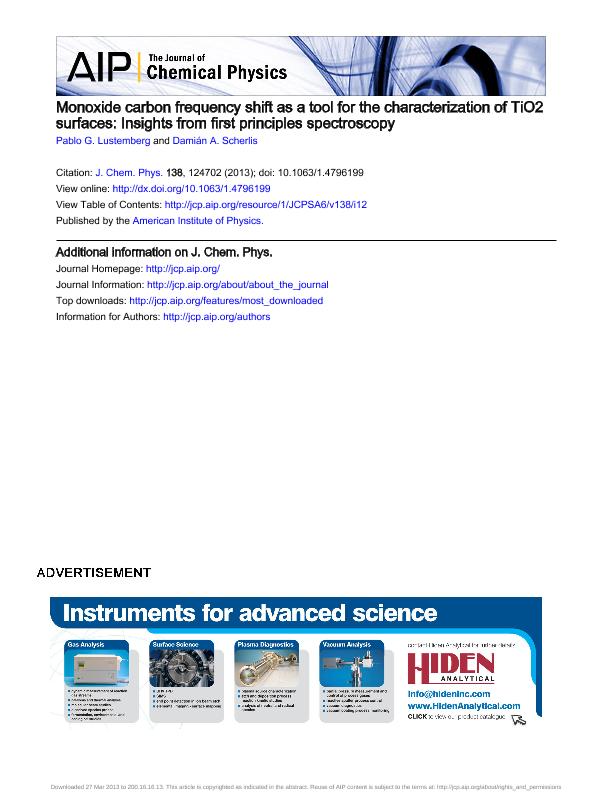Mostrar el registro sencillo del ítem
dc.contributor.author
Lustemberg, Pablo German

dc.contributor.author
Scherlis Perel, Damian Ariel

dc.date.available
2016-07-04T18:41:56Z
dc.date.issued
2013-03
dc.identifier.citation
Lustemberg, Pablo German; Scherlis Perel, Damian Ariel; Monoxide carbon frequency shift as a tool for the characterization of TiO2 surfaces: Insights from first principles spectroscopy; American Institute of Physics; Journal of Chemical Physics; 138; 12; 3-2013; 124702-124710
dc.identifier.issn
0021-9606
dc.identifier.uri
http://hdl.handle.net/11336/6331
dc.description.abstract
The adsorption and vibrational frequency of CO on defective and undefective titanium dioxide surfaces is examined applying first-principles molecular dynamics simulations. In particular, the vibrational frequencies are obtained beyond the harmonic approximation, through the time correlation functions of the atomic trajectories. In agreement with experiments, at low CO coverages we find an upshift in the vibration frequency with respect to the free CO molecule, of 45 and 35 cm-1 on the stoichiometric rutile (110) and anatase (101) faces, respectively. A band falling 8 cm-1 below the frequency corresponding to the perfect face is observed for the reduced rutile (110) surface in the low vacancy concentration limit, where the adsorption is favored on Ti4+ sites. At a higher density of defects, adsorption on Ti3+ sites becomes more stable, accompanied by a downshift in the stretching band. In the case of anatase (101), we analyze the effect of subsurface oxygen vacancies, which have been shown to be predominant in this material. Interestingly, we find that the adsorption of CO on five coordinate Ti atoms placed over subsurface vacancies is favored with respect to other Ti4+ sites (7.25 against 6.95 kcal/mol), exhibiting a vibrational redshift of 20 cm-1 . These results provide the basis to quantitatively assess the degree of reduction of rutile and anatase surfaces via IR spectroscopy, and at the same time allow for the assignment of characteristic bands in the CO spectra on TiO2 whose origin has remained ambiguous.
dc.format
application/pdf
dc.language.iso
eng
dc.publisher
American Institute of Physics

dc.rights
info:eu-repo/semantics/openAccess
dc.rights.uri
https://creativecommons.org/licenses/by-nc-sa/2.5/ar/
dc.subject
Tio2 Surface
dc.subject
Car-Parrinello
dc.subject
Carbon Monoxide
dc.subject
Ir Spectroscopy
dc.subject.classification
Físico-Química, Ciencia de los Polímeros, Electroquímica

dc.subject.classification
Ciencias Químicas

dc.subject.classification
CIENCIAS NATURALES Y EXACTAS

dc.title
Monoxide carbon frequency shift as a tool for the characterization of TiO2 surfaces: Insights from first principles spectroscopy
dc.type
info:eu-repo/semantics/article
dc.type
info:ar-repo/semantics/artículo
dc.type
info:eu-repo/semantics/publishedVersion
dc.date.updated
2016-05-27T19:46:09Z
dc.journal.volume
138
dc.journal.number
12
dc.journal.pagination
124702-124710
dc.journal.pais
Estados Unidos

dc.journal.ciudad
New York
dc.description.fil
Fil: Lustemberg, Pablo German. Consejo Nacional de Investigaciones Científicas y Técnicas. Centro Científico Tecnológico Rosario. Instituto de Física de Rosario (i); Argentina. Consejo Nacional de Investigaciones Científicas y Técnicas. Oficina de Coordinación Administrativa Ciudad Universitaria. Instituto de Química, Física de los Materiales, Medioambiente y Energía; Argentina. Universidad de Buenos Aires. Facultad de Ciencias Exactas y Naturales. Departamento de Química Inorgánica, Analítica y Quimica Fisica; Argentina
dc.description.fil
Fil: Scherlis Perel, Damian Ariel. Consejo Nacional de Investigaciones Científicas y Técnicas. Oficina de Coordinación Administrativa Ciudad Universitaria. Instituto de Química, Física de Los Materiales, Medioambiente y Energía; Argentina. Universidad de Buenos Aires. Facultad de Ciencias Exactas y Naturales. Departamento de Química Inorgánica, Analítica y Quimica Fisica; Argentina
dc.journal.title
Journal of Chemical Physics

dc.relation.alternativeid
info:eu-repo/semantics/altIdentifier/doi/10.1063/1.4796199
dc.relation.alternativeid
info:eu-repo/semantics/altIdentifier/doi/http://dx.doi.org/10.1063/1.4796199
dc.relation.alternativeid
info:eu-repo/semantics/altIdentifier/url/http://scitation.aip.org/content/aip/journal/jcp/138/12/10.1063/1.4796199
Archivos asociados
